The Ceylon Chamber of Commerce (CCC) in collaboration with the Australian Government-funded Market Development Facility (MDF) hosted a series of events titled, ‘The Business Case for Climate Change Adaptation for Agribusinesses,’ to increase awareness of local agribusinesses on the risks posed by climate change to their business models.
The kick-off event of the series, ‘Experience from Industry Leaders,’ took place on Tuesday, 24 August, at 9 AM via Zoom and brought together a variety of prominent Sri Lankan business leaders who have identified climate change as a risk in their own business models and taken steps towards adaptation and mitigation.
The event was opened by Ms. Amanda Jewell, Australian Deputy High Commissioner to Sri Lanka. A panel discussion followed, featuring Dilhan Fernando, CEO Dilmah Tea Company PLC (keynote speaker), joined by Ms. Shea Wickramasingha, Group Managing Director, CBL Group; Charitha Subasinghe, President – Retail, John Keells Holdings PLC; Dr. Rohan Fernando, Managing Director, Aitken Spence Plantation Managements PLC; and Dr. Giriraj Amarnath, Principal Researcher and RGL – Disaster Risk Management and Climate Resilience, International Water Management Institute.
The webinar was be moderated by Nisthar Cassim, Senior Journalist and Editor of the Daily Financial Times. An interactive Question and Answer session followed the discussion.
The series aimed to encourage agribusinesses to invest in adaptation strategies, with a long-term view of achieving bottom-line growth. As a key outcome of the event, participating agribusinesses will have the opportunity to explore the possibility of accessing MDF funding to invest in socially inclusive and sustainable climate change adaptation and mitigation strategies.
“It is imperative that agribusinesses are aware of the impacts of climate change and are equipped to adapt. This is important, not only for safeguarding the planet and its resources, but also to ensure that Sri Lankan businesses stay globally competitive and continue to support livelihoods of Sri Lankan men and women who depend on agriculture for their livelihoods. MDF looks forward to partner with agribusinesses to implement climate smart and inclusive business models,” said Momina Saqib, Country Director of the Market Development Facility.
Sri Lanka’s agriculture sector contributes to 7.8 per cent of GDP. Approximately, 29 per cent of the country’s labor force is employed in the sector, providing livelihood to 70 per cent of the rural population. In the last 10 years, the sector has contributed to both the domestic food requirement and about USD 2.5 billion in export proceeds on average. In this context, climate change poses a significant threat to the sector and its productivity, putting at risk the livelihoods of direct and indirect stakeholders.












